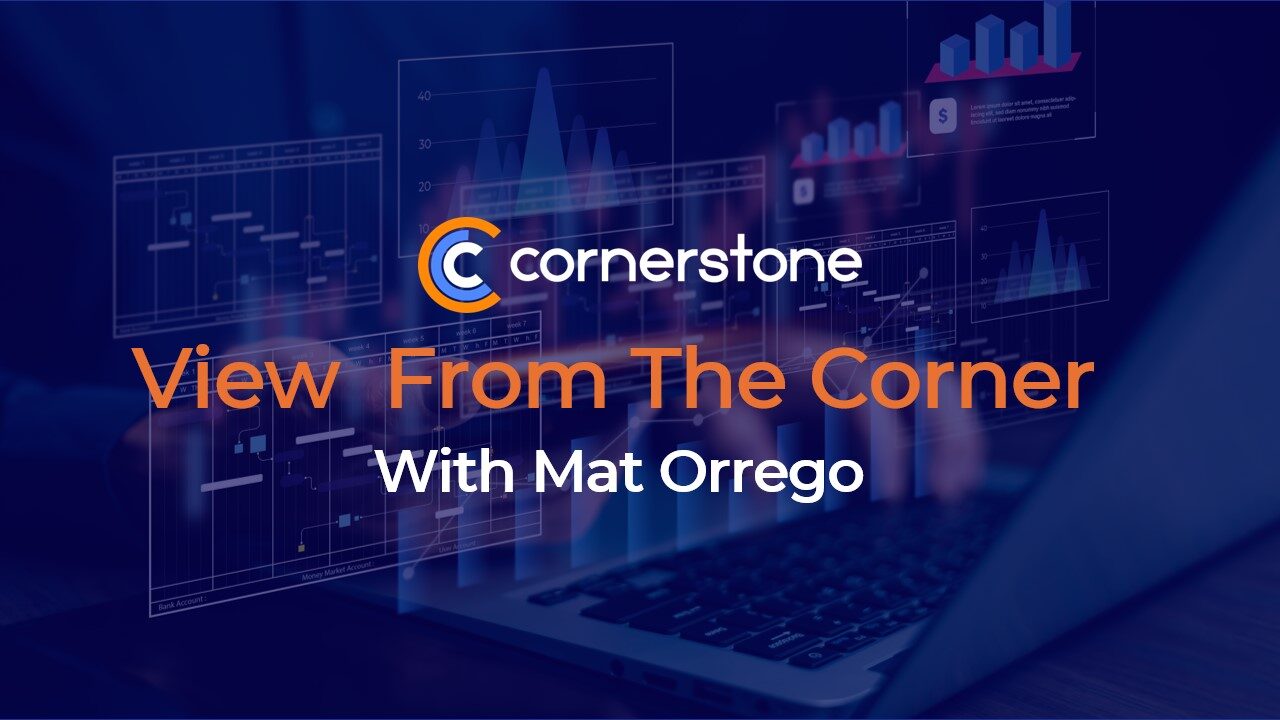With Mat Orrego
Introducing View from the Corner with Mat Orrego, CEO and Co-Founder of Cornerstone Information Systems
At Cornerstone, innovation and transformation have been at the heart of our journey since our founding 30 years ago. As we reflect on the path we’ve traveled, we are excited to share the launch of our new series, View from the Corner. In this premiere episode, Mat Orrego, our CEO and Co-Founder, shares insights from his career and discusses the evolving landscape of the travel and technology industries with thought-provoking clarity.
Mat began his entrepreneurial journey at just 25, brimming with ambition and curiosity. Today, he looks back at those formative years and the lessons learned—patience, active listening, and asking the right questions. These principles remain crucial in a world where the pace of change has never been faster.
In this episode, Mat dives into the evolution of the travel industry, the rise of self-service and digital platforms, and the transformative power of cloud services and artificial intelligence. He explores how these technologies are reshaping how we work, solve problems, and create value.
Join us as we embark on this exciting new series to learn from industry veterans, explore emerging trends, and uncover strategies to navigate the complexities of a rapidly changing world. Welcome to View from the Corner.
Transcript:
0:11
What advice would you give your younger self?
At Cornerstone, we’ve come a long way since our founding 30 years ago. Reflecting on the journey, so much has changed in the world around us. I started in business at 25, full of enthusiasm and innocence about what I hoped to achieve in my career. Over the years, you learn valuable lessons—ones I wish I could share with my younger self.
If I could go back, I’d tell myself to be patient, to listen more, and to ask better questions. In today’s world, more than ever, understanding begins with asking the right questions. Taking a moment to pause, assess complexities, and truly grasp what a customer, an employee, or a business challenge needs can lead to meaningful solutions.
Early in my career, I graduated from Indiana University’s Kelley School of Business—back then simply called the School of Business—and began in financial services. However, I quickly realized my passion was for owning and managing my own business, driven by a desire to control my time. Time, I found, is one of the most precious and finite resources we have.
1:51
What are some of the biggest changes you’ve seen in the industry?
As I ventured into the travel industry, the value of time, productivity, and efficiency became even clearer. Initially, the industry was about people serving other people. Travel agents operated out of physical offices, helping customers plan leisure or business trips. But that model has evolved dramatically. Today, self-service and online platforms dominate. Customers book their trips, shop, and even handle everyday essentials—like ordering toothpaste—all through digital systems.
4:26
Where do you see Cornerstone in 5 years?
This shift in the travel industry mirrors broader changes in how consumers interact with businesses. The rise of online platforms and self-service models has revolutionized everything. Now, instead of calling an agent, people handle bookings themselves, often using cloud-based systems and advanced technology.
Looking forward, the intersection of cloud services and artificial intelligence represents the next great transformation. Generative AI and similar technologies are becoming incredibly accessible, offering unprecedented opportunities to automate and optimize processes. In five years, the impact of AI will be profound. Tasks once handled by programmers—manual coding, for example—will largely be managed by AI.
The future will require less focus on the mechanics of getting work done and more on understanding industries, destinations, and business strategies. Success will hinge on our ability to communicate effectively with technology, leveraging it to achieve the most productive and efficient outcomes.
Ultimately, the human element—the expertise, the strategic thinking, and the questions we ask—will remain critical. But the way we interact with technology and how work gets accomplished will continue to evolve dramatically.
